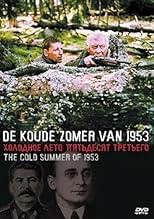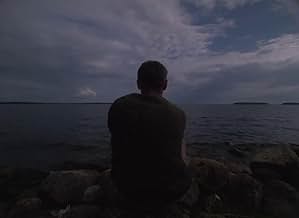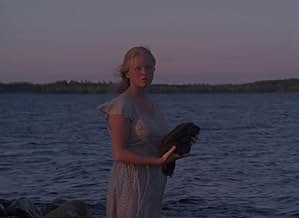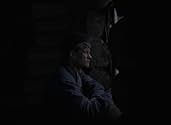Kholodnoe leto pyatdesyat tretego
- 1988
- 1h 41min
NOTE IMDb
7,8/10
2,7 k
MA NOTE
Ajouter une intrigue dans votre langueFormer political inmates Sergei and Nikolai live as exiles in a remote Siberian village. After the general Soviet gulag amnesty of 1953 8 pardoned common criminals terrorize the inhabitants.Former political inmates Sergei and Nikolai live as exiles in a remote Siberian village. After the general Soviet gulag amnesty of 1953 8 pardoned common criminals terrorize the inhabitants.Former political inmates Sergei and Nikolai live as exiles in a remote Siberian village. After the general Soviet gulag amnesty of 1953 8 pardoned common criminals terrorize the inhabitants.
- Réalisation
- Scénario
- Casting principal
- Récompenses
- 1 victoire et 2 nominations au total
Sergey Vlasov
- Vitek - bandit
- (as S. Vlasov)
Vladimir Golovin
- 'Baron'
- (as V. Golovin)
Andrey Dudarenko
- Mikhalych - bandit
- (as A. Dudarenko)
Aleksei Kolesnik
- 'Kryuk' - bandit
- (as A.Kolesnik)
Viktor Kosykh
- 'Shurup' - bandit
- (as V.Kosykh)
Boris Plotnikov
- syn Kopalycha
- (as B. Plotnikov)
Elizaveta Solodova
- Starobogatova - zhena Kopalycha
- (as Ye. Solodova)
Konstantin Labutin
- Selyanin
- (as K. Labutin)
Avis à la une
That's exactly the kind of Russian film I crave for. No propaganda here, not any garbage junk destined to idiotic audiences. It is a dark, gloomy, realistic analysis of the Russian society thru this solid, strong story, pulled by powerful characters. Not destined to wide western countries audiences though, they are not smart enough - I mean the bulk of audiences, not EVERY AUDIENCE. I thought of LEVIATHAN, THE MAJOR, other outstanding features from Russia. OK, it may be slow, but it coincides with the plot set in Siberia. It is not FAST AND FURIOUS either.....The story is really engrossing for intelligent people who are curious enough to discover and watch it.
Generally, amnesty is provided to prisoners on humanitarian grounds in order to initiate reform process. However, there are instances when an offer of amnesty is misused by certain prisoners. Director Alexander Proshkin's Russian film "The cold summer of 1953" chronicles how some escaped convicts misuse amnesty provided to them to terrorize innocent villagers. Based on a series of true events which have a lot of historical significance for Russian people, Proshkin's film faithfully describes how the clash of ideologies continue to have a massive impact on the destinies of ordinary people. In the case of this film, Soviet leader Stalin's death enabled Beria to proclaim amnesty for hardened criminals, a group of people who were deemed as 'enemy of the state'. For a film which has a steady balance of action, drama and thriller, it is surprising to note that some space was also kept for portraying the innocence of ordinary people who were determined to continue with their ordinary lives. This quality would surely appeal to all viewers who might like to explore new facets of this film.
For thirty years, Joseph Stalin kept a tight grip on the Soviet Union, imprisoning and murdering millions. After he died, a number of people whom he had imprisoned got released. It turned out that among those were people who had committed violent crimes. Aleksandr Proshkin's "Kholodnoye leto pyatdesyat tretego" ("Cold Summer of 1953" in English) looks at the result of this. When a group of dangerous criminals takes over a rural village, a former political prisoner has to resort to extreme measures.
The movie got released during Mikhail Gorbachev's presidency. It was appropriate that in the period when criticism of its history became part of official Soviet policy, movies like this and "Little Vera" came out. They were finally willing to admit that they had been wrong about so many things. There could be no doubt that Stalin himself was the USSR's biggest criminal of all. Even Lavrentiy Beria, who freed a number of prisoners, organized the Soviet seizure of power in Eastern Europe.
I wouldn't call "Cold Summer of 1953" a masterpiece. At times it seems like an action movie. But it's a good look at this important part of Soviet history.
The movie got released during Mikhail Gorbachev's presidency. It was appropriate that in the period when criticism of its history became part of official Soviet policy, movies like this and "Little Vera" came out. They were finally willing to admit that they had been wrong about so many things. There could be no doubt that Stalin himself was the USSR's biggest criminal of all. Even Lavrentiy Beria, who freed a number of prisoners, organized the Soviet seizure of power in Eastern Europe.
I wouldn't call "Cold Summer of 1953" a masterpiece. At times it seems like an action movie. But it's a good look at this important part of Soviet history.
Grainy stock gives this film an almost documentary feel and has the additional effect of underscoring the dismal state of the trading outpost at which most of the events take place. _The Cold Summer of 1953_ is more authentic and less hysterical than _Gulag_, although it makes the same points with regards the social standing (or, more accurately, the complete lack of social standing) of political prisoners in postwar Russia. Looked down upon by even the most violent of criminals, the two political exiles still maintain a sense of dignity and, to some extent, honour, in the face of their privations.
Many said in their comments that this movie is sort of an action movie about good guys shooting bad guys. To me, this perception totally misses the idea of the movie. This film is absolutely not about shooting and action, even though there is plenty of it. It is about many things. It is about physical and more importantly deep psychological suffering of people who lived in exile during Stalin/Soviet repressions.
This film shows in a dramatic way lives of two people and their families being ruined buy the System. The film portrays two examples (out of millions) of one person who's gone through pain of World War II and one of a dedicated scientists who found themselves been thrown to a jail and their hopes broken at times when they were at their peak in life. Then they found themselves existing for many long and cold years in Siberian exile watching their lives slipping away from them.
Another important point of the film is showing the entire generations of people (with very few exceptions) being brainwashed and molded the way that state wanted them to be. At the same time the cynical nature of the system itself is also portrayed in many neat and subtle ways.
This film is like a book were you need to read between the lines, here you need to see behind the image. To me, being grown up in Soviet Union - it comes naturally in this case and the film grips me with its drama for its entire length having a very moving ending. But probably if you are not fluent in CCCP history and you don't know for example who Beria was, what the laws were like during cult of personality, what was the Belarussian front in World War II, who was Ordzhonikidze - without such little things and many others the film will be either very hard to follow (in this case it probably becomes sort of pretentious art house stile flick) or you just miss it completely and it is going to be just an aged action movie. Well watch it if you can, but it is 9 out of 10 from me.
This film shows in a dramatic way lives of two people and their families being ruined buy the System. The film portrays two examples (out of millions) of one person who's gone through pain of World War II and one of a dedicated scientists who found themselves been thrown to a jail and their hopes broken at times when they were at their peak in life. Then they found themselves existing for many long and cold years in Siberian exile watching their lives slipping away from them.
Another important point of the film is showing the entire generations of people (with very few exceptions) being brainwashed and molded the way that state wanted them to be. At the same time the cynical nature of the system itself is also portrayed in many neat and subtle ways.
This film is like a book were you need to read between the lines, here you need to see behind the image. To me, being grown up in Soviet Union - it comes naturally in this case and the film grips me with its drama for its entire length having a very moving ending. But probably if you are not fluent in CCCP history and you don't know for example who Beria was, what the laws were like during cult of personality, what was the Belarussian front in World War II, who was Ordzhonikidze - without such little things and many others the film will be either very hard to follow (in this case it probably becomes sort of pretentious art house stile flick) or you just miss it completely and it is going to be just an aged action movie. Well watch it if you can, but it is 9 out of 10 from me.
Le saviez-vous
- AnecdotesThe role in this film, unfortunately, was the last for the brilliant and beloved actor Anatoliy Papanov.
Meilleurs choix
Connectez-vous pour évaluer et suivre la liste de favoris afin de recevoir des recommandations personnalisées
- How long is The Cold Summer of 1953?Alimenté par Alexa
Détails
Contribuer à cette page
Suggérer une modification ou ajouter du contenu manquant

Lacune principale
By what name was Kholodnoe leto pyatdesyat tretego (1988) officially released in Canada in English?
Répondre


































